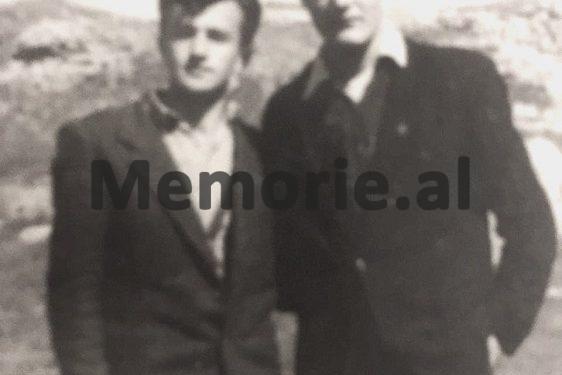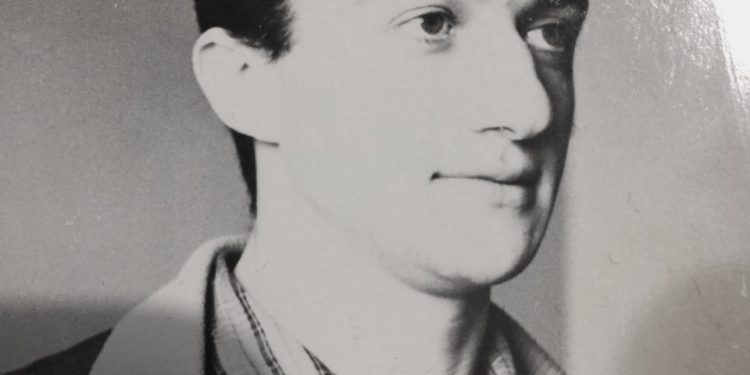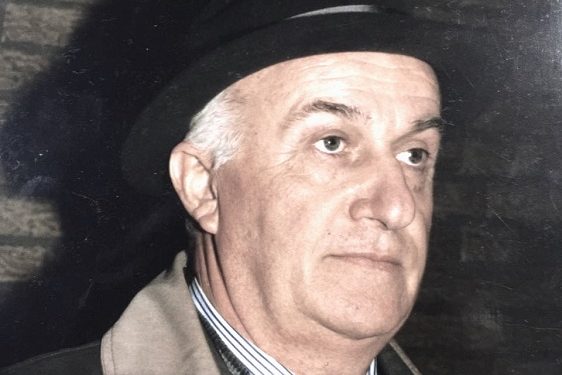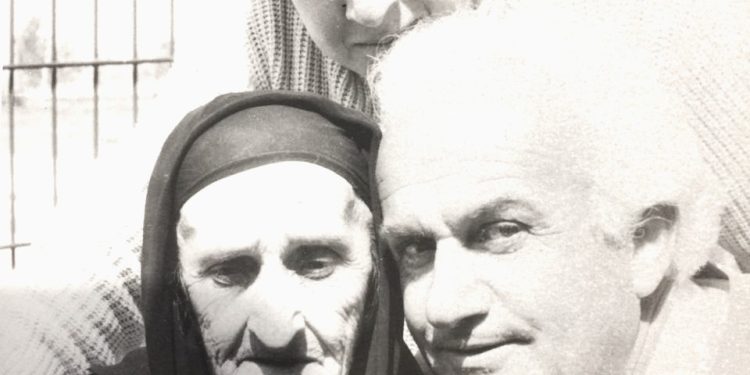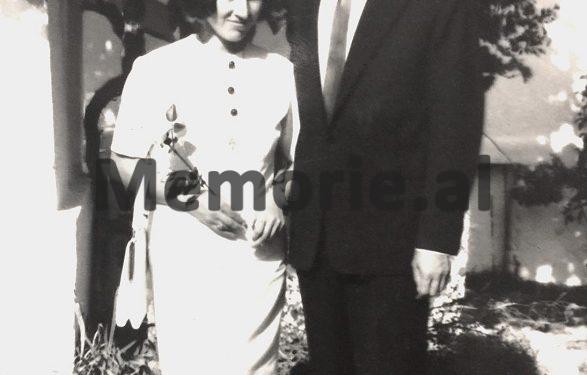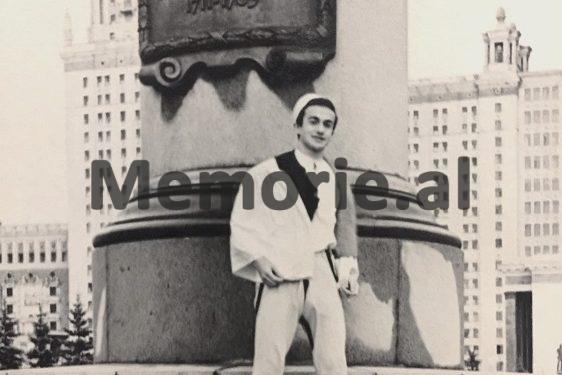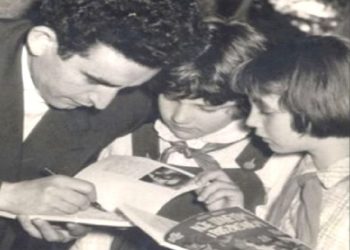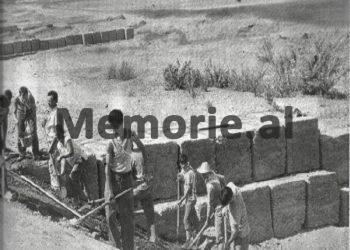From Sokrat Shyti
Part Twenty-Two
Memorie.al / Writer Sokrat Shyti is the ‘great unknown’ who, for several years, has shown the tip of the iceberg of his literary creativity. I say this based on the limited number of his published books in recent years, mainly the voluminous novel ‘Nata fantazmë’ (Tirana 2014). The novels: ‘BEYOND MYSTERY’, ‘BETWEEN TEMPTATION AND WHIRLPOOL’, ‘DIGGING OF NIGHTMARES’, ‘SHADOW OF SHAME AND DEATH’, ‘COLONEL CHIEF DREAD’, ‘DREARY HOPES’, ‘TWISTS OF FATE’ I, II, ‘SURVIVAL IN THE COWSHED’, as well as other works, all novels ranging from 350 to 550 pages, are in manuscripts waiting to be published. The dreams and initial fervor of the young novelist, returning from studies abroad full of energy and love for art and literature, were cut short early by the harsh blade of the communist dictatorship.
Who is Sokrat Shyti?
Having returned from studies at Moscow State University just after the interruption of Albanian-Soviet relations in 1960, Sokrat Shyti worked at Radio ‘Diapazon’ (which at that time was located on Kavajë Street), in an editorial team with his journalist friends – Vangjel Lezho and Fadil Kokomani – both of whom were later arrested and subsequently executed by the communist regime. Besides the radio, 21-year-old Sokrat had passionate literary interests at that time. He wrote his first novel ‘Madam Doktoresha’ and was on the brink of publication, but… alas! Immediately after the arrest of his friends, as if to fill the cup, one of his brothers, a painter, escaped abroad.
Sokrat was arrested in September 1963, and in November of that year, he was subjected to family internment (with his mother and younger sister) in a location between Ardenica and Kolonje of Lushnja. For 27 consecutive years, the family lived in a cow shed made of reeds, without windows, while Sokrat was subjected to forced labor. Throughout those 27 years, he was legally obliged to report three times a day to the local authority. He had no right to move from the place of internment, was deprived of any kind of documentation, etc. Under these conditions, amidst a cow shed, he gave birth to and raised his children. Precisely from this event, or more accurately, a very long story of persecution, he was inspired to write the book ‘Survival in the Cowshed’!
Agron Tufa
Continues from the previous issue
EXCERPT FROM THE BOOK, ‘SURVIVAL IN THE COWSHED'”
– “Take some oil to the tractor drivers, in the fields where they work…”!
– “I figured it out,” he interrupted me. “In my opinion, you would work better in agriculture. Not because it’s easier here, as at first, you would have some difficulties until you get used to it. But you won’t have to carry heavy loads on your back, nor would you walk for kilometers through mud and slush. In my view: they have intentionally found you this work so that you can get into trouble. Because no matter how well the tractor driver treats you, he still can’t help you since the tractor won’t work without fuel.
On the other hand, in agriculture, the work is different: if you get tired, you can sit down for a bit. When it rains, you are paid for a rainy day. Moreover, the working days are in the hands of the brigade leader. He writes them himself and seals them. No matter how much of a scoundrel the brigade leader is, he needs you. Because you will prepare the educational formats for the basic Party organization and you will make the work reports. Why don’t you try to switch to agriculture?” – He added, giving me a look.
– “I made a request to the head of the locality, but I didn’t get a response.”
– “I understand. This shows that you are not dependent on the head of the locality. He only has the keys to the straw, meaning he conveys the orders from the Executive Committee of the district that come from the Party Committee. These tricks are all linked in a chain. May God give you energy and patience?” – He wished. “They don’t say for nothing: when the judge catches you, you won’t have where to argue…”
The conversation with the unknown driver was a wise lesson, which helped me to relieve some of the stress caused by the obligation to present myself at the Internal Affairs Directorate, as if I had committed a criminal act. I certainly didn’t tell my mother the truth about why the deputy chairman called me with such urgency. I had to lie to her: I told her that I fulfilled some bureaucratic documents that were left neglected, and these, to emphasize their own importance, sent me the local operative.
– “Meanwhile, I thought that this urgent call had something to do with the unexpected visit of the chairman of the League. Because I am a thousand percent sure that they did not like his arrival and the meeting with you. And since they couldn’t stop him, they turned towards you aggressively. Anyway. I’m not curious, and I don’t want to know the details, because even if there are, you won’t tell me. My concern is that you have to shake off this burden from yourself, because this stall has this bitter milk!”
Life continued through a grim monotony. The only connection to the Albanian world was Radio “Rekord,” which allowed us to listen to the news and some broadcasts when the weather permitted, and didn’t hinder my exhaustion. Meanwhile, connections with my hometown were still not established, because to go there, I would have to get permission from the Internal Affairs Directorate, and for this, I would necessarily have to disclose the purpose of the trip. They had warned me: the fact that my older sister lives in this city is not accepted as a valid reason and justification, and as a member of the same family, I must inform her about my mother’s health.
The officers of the Internal Affairs Directorate made it clear to me from the start: “It is strictly forbidden for you to go to her house! If it crosses your mind to take the wrong step, apart from the measures against you, you will cause troubles for your sister: first and foremost, her job as a centralist at the PTT will be at risk.” Although they didn’t mention what serious consequences would fall on my brother-in-law’s shoulders after my visit, I could guess: his continued position as an accountant at the State Bank could be in question, alongside the temptations in the basic Party organization, starting from the lightest, being dismissed as a secretary, severe reprimand on his registration card, for blatant violation of the Party’s statutes, and lack of revolutionary vigilance, since he knowingly accepted the declassed brother-in-law into his home!
It was completely natural that the absence of her oldest daughter, which left her feeling despair to the point of pain, was frustrating for my mother, especially as she expected the opposite – that her daughter would be closer to her than anyone else to alleviate, even slightly, the stress of being exiled in the cowshed. Even if I explained to her how things really were, that Neta was not allowed to come to us, she would only be astonished as to why such a harsh stance was taken against her, as if she had raised her hand against the state when during the war, she and her family were the main shelter for the movement to liberate the country from foreign invaders! To mitigate her pain, I told her that my sister was always thinking about us, but she had to act wisely to protect her family since the desire to see each other was valuable for both sides. But my mother did not accept this explanation. She blamed my sister, saying that she lacked the will, which is why she did not make any effort. She backed her blaming with the reasoning that where she worked, she had the means to connect by phone with all those who could grant her permission.
Under these conditions, to soften her anger, I used a kind tone: “You are not alone here at all. While I have to roam up and down, you can chat with the little girl. We must thank those in power who turn a blind eye and allow your daughter to engage a bit in sewing clothes, which helps us earn enough to buy daily bread. And it’s even better that, in most cases, payments are made in goods: they bring us beans, eggs, cornmeal, field birds or chicken, fresh or melted butter, bulgur, boiled and roasted corn, and trahana!”
When she realized and was convinced that her oldest daughter would not come, she began to gradually fill the void of her absence by drawing closer to the wife of the forest guard, who frequently came in and out of our place. She was a well-dressed woman and treated our family with kindness. She was very curious to learn about urban living, and my mother was willing and tireless in explaining to her patiently how meals were prepared in the city and how to organize the home to look as presentable as possible with the few belongings we had. The friendly relationship with the neighbor led to interactions with other women from the village, which eased the ice of fear and they were no longer frightened by the terrifying label of “declassed.”
They began to come without hesitation to our cowshed and felt comfortable when they were there. There wasn’t a day in which they didn’t praise my mother and sister for the great change they had made to the cowshed, with their minds and hands, transforming it into such a pleasant place that they longed to see and spend time in! Later, as the conversations became sweeter, the village women felt it was necessary to bring their daughters with them so that they could watch the dressmaker as she tailored pieces of fabric, with a remarkable precision, forming them into the flowing shapes of women in a very short time!
Certainly, the main merit for these new relationships belonged to my mother, who knew how to win them over. She understood in due time that female companionship, in a way, is a stimulating influence in finding the appropriate form so that a similar bond could be created among me and the villagers, considering the fact that a female worldview finds common ground much more quickly than a harsh male vision.
But while the initial “hostile” attitude towards me was slowly softening, the same could not be said for my approach to my friends from my hometown, as my main concern revolved around the core of our mutual connection. I was particularly troubled by the fact that I still had not established any contacts, keeping in mind without a doubt that they also shared the same wish, considering we had spent our childhood years together. Our mature age understood that the desire alone was not enough to overcome the heavy ideological barriers, the terrible class struggle, and especially that the label “declassed” did not intimidate them.
Under these circumstances, an unexpected and shocking surprise had to happen, as a necessary request that touched the interests of the highest party authorities and local government for some extremely significant reason, which placed them before the most undesirable dilemma, that my presence alone could liberate them from the deadlock of failure, and since they had no other options, they were forced to break the ideological taboo. However, considering the living conditions and my devaluation to the point of zero, this mindset remained utopian, a wishful dream, born of imagination.
Nevertheless, the everlasting postulate: “Hope dies last” always keeps the path of possibility open, and one cannot completely deny one of the mysterious forms of earthly life, as the fulfillment of a desire, which you have deemed a product of imagination (as it seems absurd and entirely impossible to reach a decision of lower rank against a major governmental decision), suddenly presents itself as a marvel, a miraculous solution appears as a vision…!
Although it sounds like an unbelievable paradox and an entirely dreamlike phenomenon that serves to nourish our hope, this fortunate occasion emerged like a bright rainbow in the sky of a very gloomy time: the Cultural Center of the city was ordered by the District Party Committee to take measures to present itself with dignity at the National Olympics in Shkodra with the amateur theater group. The Central Commission of the Ministry of Culture, established specifically for this activity, had designated the play “Vatra e huaj” for the district of Lushnja. Upon receiving the notification, roles were distributed, and a clear directive was given to memorize the lines, as in three days rehearsals would begin around the table to follow the continuity of the dialogues for memory reinforcement.
The amateur troupe consisted of local teachers, born and raised in this city, with the exception of one, who had come from Tirana and experienced a vital family issue when the play moved from the table to the stage, and the characters learned their movements and how to behave towards one another. I did not know the true reason why he had to leave at the critical point and was not interested in finding out. To me, what mattered was what would happen after his departure: whether efforts would be made to avoid failure by finding a replacement as soon as possible! Because this necessary change presented two quite serious difficulties: first, the very short time to learn the part and understand the role. Second, the replacement had to have a penchant for theater.
Confused by this difficult situation, my childhood friends (who were tasked with finding a suitable replacement) immediately thought of me, but without openly expressing this thought, since it first needed to be clarified who would have the courage to mention my name out loud. After much whispering, this heavy burden fell on the poet Haliti, as it rightfully belonged to him as the director of the Writers’ and Artists’ League of the district.
(I do not know the details about how the intense discussion ignited in the District Party Committee regarding my inclusion in the amateur theater troupe of the Cultural Center. But I can imagine that there must have been many objections because appearing on stage would publicly accept a kind of rehabilitation of my unjustly tarnished figure, and it would inevitably stir the dormant indignation against the contempt shown towards an innocent journalist, treated almost like an animal, forced to live in a cowshed. According to a simple reasoning, now that the surprise put them before the test of saving their skins from the brutal punishment of their superiors, and since they could not find any other way of salvation, they were forced to call upon “the declassed” to cross the river without getting wet, pushing the responsibilities away from one another as a means of escaping the class struggle.)
For my fortunate fate, the vacant role was that of a negative character, the son of an aristocratic old woman, who harbored micro-bourgeois mentality and sought to flee the country! This fact suited the main leaders of the local commission perfectly. They even based their reasoning on why it was necessary and permissible to assign this negative role to a declassed individual, explaining that this would make the play more convincing for the local spectators when the first performance was presented to the selected audience, authorities, and jury.
Of course, the final decisive word would come from the First Secretary of the Party Committee. Thus, his response was eagerly awaited. At that moment, I found myself at a profoundly worrisome turning point; a “yes” from him would mark the beginning of a life-changing turn, at least softening the beastly attitude towards me and my family, primarily leading to our removal from the cowshed and providing me with a new employment opportunity! On the other hand, a firm “no” would cement the decision of the Government Commission, inciting vengeance and intensifying the class struggle against me, signaling to subordinates: take their soul!
Fortunately, the big Party chief was one of those rare leaders with culture and intellectual vision, a lover of art, who saw cultural activities through the prism of nurturing talents and wanted to instill this mentality in his subordinates. In addition to this admirable quality, he knew us personally and adored my older brother, an actor in the People’s Theater. Therefore, when he learned that this family had been treated by the Internal Affairs Directorate as a family of criminals, he expressed open indignation, harshly reprimanding his direct subordinates for not alerting him on the first day of the arrival of the Government Commission’s decision on Internment-Expulsions, according to proper procedures.
The chairman of the Internal Affairs Directorate, cornered by this violation, defended himself by saying that he was not there; thus, the assistant, the deputy chairman, handled the arrangement of the family interned from Tirana. However, feeling that this explanation did not absolve him of responsibility, he made a self-criticism and supported the correct opinion of the First Secretary, admitting that the treatment towards the family of the former radio journalist was akin to treating sworn enemies of the Party! Therefore, this grave mistake had to be corrected.
The self-criticism by the chairman of the Internal Affairs Directorate, in front of the First Secretary of the Party Committee, prompted a thorough reconsideration of my family’s case by the three highest local leaders, leading to a concrete proposal addressed to the Government Commission on Internment-Expulsions for the mitigation of the punishment, to convert the internment into expulsion, justifying the measure by stating that this approach aligned with the correct behavior of the Shyti family, which, just like yesterday, had been one of the illegal bases during the Nazi-fascist occupation, and today had consciously fulfilled all legal obligations without raising any complaints.
No one, including the oracles, could have predicted what would happen: that the replacement of the performer for a negative role in the play “Vatra e huaj” would bring about a surprising solution for me and my family, like a miracle descended from the sky, thanks to the liberal vision of the top district leader, who, with a decisive order, dispelled the threats of oppression, cleared the weather for a time, created a political climate of rapprochement towards me and my family, ignited the green light for a more humane existence, and opened new employment opportunities that had previously been forbidden fruit for us!…
Just as I envisioned and hoped, my entry into the amateur troupe of the Cultural Center was met by my childhood friends with cheers and heartfelt embraces! Some were moved to tears to see me so close and to hear my voice! What happened in those moments felt like an optical illusion, not a tangible, real phenomenon, because the isolation of those three years had penetrated deep into the plasma of my nervous system; it was going to take time to shed the shell of quarantine from myself, as I still could not believe that this rapprochement would have longevity, that it could continue in the future: the gnawing impulse of doubt whispered that after the departure of the benefactor, the First Secretary of the Party Committee, the silent vengeance against me might reemerge in other menacing forms, perhaps even more ferocious and deadly!…
Thanks to my personal memory, within only a few hours, I learned the text by heart and delved deeply into the essence of the role. I even read the other roles connected to my character to fully embody his mental and spiritual world. Fortunately, I encountered no difficulties in mastering the role, as there were more moments of spontaneous bursts than layered emotional burdens! /Memorie.al
Continues in the next issue
Copyright©“Memorie.al”
All rights to this material are exclusively and irrevocably owned by “Memorie.al”, in accordance with Law No. 35/2016 “On Author’s Rights and Related Rights”. It is strictly prohibited to copy, publish, distribute, or transfer this material without the authorization of “Memorie.al”; otherwise, any violator will be held liable under Article 179 of Law 35/2016.




